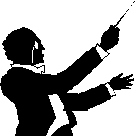
He was drunk; he was really in his cups. I knew that in his present state of worry about his aortic whoogee, I should just shut up and nod my head. But that didn't stop me. I dropped my stick and gloves and let him have it.
Body Checks into the CD Corner
(a review of
Mercury's Living Presence CD reissue of Dorati conducting
Respighi. Mercury:432-007-2)
(Because this was Ian's first review ever, it probably doesn't reflect the
inimitable style that he evolved in his later reviews. It also reveals that he
know more about "culture" than he lets on.)
by Ian Klymchuk
(President, Lucan Chapter, Philistine Liberation Organization)
Last night I went out to the townhouse complex to see Benny. He and I had grown up together as rink rats, and we liked to get together every once in awhile to pretend we were gonna toss back a two-four and watch Hockey Night in Canada.
He'd been a goalie, but he had probably stopped one too many pucks with his mask. He often blurted out things that didn't go along with what we'd been talking about. I thought he was pretty funny when I could figure out what he was trying to say. Most of the time, though, nobody knew why he was laughing to himself.
Anyways, Benny's old lady had called during the afternoon. She was worried that he might have something wrong with his ticker. Could I please come over and give him some reassurance and some light-hearted jock talk. I had intended to stay home with the wife and twins to watch Hockey Night in Canada with them and finish off the last of the Christmas candy, but hey -- Benny and I went back a long ways and he needed me.
So as I pulled up to the parking lot, I was as at least as concerned about Benny's frame of mind as I was about his ventricular hoohah. When he opened the door, I knew right away something wasn't quite right: He was wearing his old hockey jacket from 1959. It didn't quite fit him, but he'd managed to squeeze into it.
He'd been a tough customer. He'd chase a puck into the crowd if he thought he should. He didn't want to talk about how he was feeling. Even his kids didn't know.
So after the fifteen minutes of pretending to be trying to talk about his health, which I sort of felt I had to do since that's the excuse I used to get out of the house, we settled down in front of his new big screen tv for some nice tv watching. His old lady kept us well-supplied with beer and sandwiches, and we got to talking about the good old days in hockey.
 |
During the second intermission,
Benny started blathering about how the old players was
better than today's players, about how the old classic
goals would never be matched in modern play, and about
how the modern-day announcers was a bunch of pussy-cats
who probably drink white wine instead of beer. Except for
Don Cherry, of course. He was drunk; he was really in his cups. I knew that in his present state of worry about his aortic whoogee, I should just shut up and nod my head. But that didn't stop me. I dropped my stick and gloves and let him have it. |
"Benny," I sez. "Athletes these days are in better shape. They know more about the game. They spend all year working on it, and don't have to work construction during the off-season. They got better equipment and better technique. Same with the telecasts. Wake up and smell the coffee."
And that's about how I'd rate the disgusting reissue by Mercury of Anatoli Dorsal Fin conducting some junk Respighi. I'll bet Dorati sips white wine.
You know, you start to listen to this CD, and you think you're listening to some kids' group of fiddlers. They sound competent for kids, but not so good for the pros they think they are. They don't play in tune, and the attacks are sloppy. I've never heard the London Symphony Orchestra (the other one) sound so bad. It's like they're passing the puck from the corners without watching to make sure there's somebody there to receive it.
Yeah, yeah, ain't it a wonder how much modern technology can bring those old performances back to life? Almost like colourizing the films of the 1952 Stanley Cup. But some things should be left alone, and these performances fall into that category.
Now I like hi-tech as much as the next guy. And I'm impressed with the quality of these recordings. The trouble is I don't much like Respighi (tell me, have you ever, even once, heard someone walking down the street whistling something by Respighi? I rest my case). And these particular performances were about as good as the 1989 Maple Leafs - they belong in the cellar. Along with the wine that Dorshmotti sips.
About this time, Benny's old lady chirps in, "But Ian, didn't the game seem more real back then? The guys playing it now seem too much like robots to me."
What kind of drivel is that? I like the perfection of the new game. I hate seeing the blundering idiots make so many more bad plays when I watch reruns of old highlights. Ok, Ok, there was some real great players back when we was kids, but there was lots of bad ones, too, and the bad plays were about as much fun to watch as the kid in the next townhouse picking his nose.
Ditto the performances under the stick of Angelo Dorito. Anyone who has spent much time comparing performances of the Minneapolis Symphony (the performers on the second half of this CD) under DoorAhTee and under Skrowaczewsky knows that The Skrow really knew how to motivate his players, to get the most out of them. Dorati put up with slop, compared with The Skrow. Dumping the Door was the best thing the North Star mgmt ever did. The Skrow really understood the value of good timing and precision playing. The Skrow is to Scotty Bowman as Do-Re-Ti is to Red Kelley.
| Mercury seems to have some good techniques. But let's face the facts folks: old performances ain't what they're cracked up to be. The musicians were NOT always better. And you know, I think the conductors of the 1950s built their reputations when the tough ones was off fighting in wars and the ones who stayed home were wine-sipping wimps. And no amount of remastering will make those old performances sound as good as newer ones. |  |
So my advice? Pass on this CD. Or buy one for Benny. He seems to like that old stuff even though it ain't as good as the stuff they put out these days.
Back to the Index of Klymchuk's Reviews